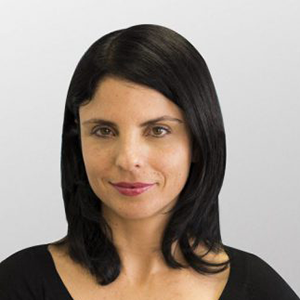
14 Sep An Interview with Einat Metzer, Emedgene

Einat Metzer leads Emedgene, a genomics company using AI to automatically interpret genetic data, so that health organizations can scale personalized care to wider populations. A computer scientist and economist by education, Einat is fascinated by the notion of applying advanced technology and science to realize the vision of personalized care. Read her full bio.
Interview with Einat Metzer, Emedgene
Q: Artificial intelligence (AI) techniques have sent vast waves across healthcare, even fueling an active discussion of whether AI doctors will eventually replace human physicians in the future. Do you believe that human physicians will be replaced by machines in the foreseeable future?
A: We still have a way to go before machines can replace the human capacity to think. I firmly believe that by keeping humans in the loop, we will maximize the value of artificial intelligence, and free up physicians to focus back on the patients. I think our collective goal should be to offload those tasks a machine could perform better than us. Machines are good at incorporating knowledge hidden in silos, as well as uncovering analytical insights in large datasets. Steve Jobs had a wonderful quote: “When we invented the personal computer, we created a new kind of bicycle…a new man-machine partnership…a new generation of entrepreneurs.” Physicians should treat AI as their new bicycle, empowering them to be better at their jobs.
Q: What are your thoughts?
A: Our own solution at Emedgene is meant to support geneticists’ decisions, rather than operating autonomously. Sequencing is easy, and becoming easier along with costs coming down. Interpreting the result of next-generation sequencing is a manual and lengthy process, performed almost entirely by geneticists.
We’ve automated – with machine learning – many parts of the variant interpretation workflow, and by doing so are able to identify causative variants in the sequencing data automatically. Humans are absolutely required to evaluate the algorithmic outputs. We do make it easier for them to do so by providing explainable AI – we display full evidence and the logic behind the machine-learning-based selection of a particular variant.
Q: Can you provide some use cases that have already successfully demonstrate the value of AI/Machine Learning in healthcare?
A: I’m going to focus on the field I’m most familiar with – genomics. Our own solution was evaluated in a joint study with Baylor Genetics. Our AI was able to identify the causative variant in 96% of cases. Baylor went through an extensive validation process, and ended up adopting it for regular daily use in their lab. For customers that adopted our technology and best practices, we’re able to reduce time of analysis by an order of magnitude. Scaling genomics interpretation by utilizing automated algorithmic approaches is core to our ability to reach mass populations. Moreover, it’s the only way to materialize a future where patients’ genomics data will be considered in any clinical decision making, thereby, providing a more individualized, better care.
Q: What areas in healthcare will benefit the most from AI/Machine Learning applications and when will that be?
A: In general, any area in medicine where there are heavy manual processes of analyzing large amounts of data, done by a small crowd of highly specialized experts could benefit from utilizing AI applications. When judged this way, most areas in medicine can benefit from utilizing AI. Medicine, in general, is relying on communities of experts that are consuming growing amounts of data to make complex data-driven decisions. The primary challenge to benefiting from AI applications then becomes the availability of solid datasets, multidisciplinary teams of clinicians-machine learning experts that work closely to develop the algorithmic approach, and a concrete drive for innovation.
We should be looking closely at any area of healthcare with a limited supply of physicians. There are only several thousand trained geneticists worldwide, it’s clear that they won’t be able to keep up with the demand for their interpretation services as demand (and insurance coverage) for genetic testing grows.
We need to keep asking ourselves – what can we teach machines to do, so that we free up our physician’s time and resources for tasks only they can perform.
Q: What are some of the challenges to realize AI/Machine learning in healthcare?
A: Some of the challenges we routinely see companies in AI/ML for healthcare face:
Access to large enough data sets. We all saw the recent Google-Ascension deal land it in the hotspot, due to unclear patient consent. The data is out there, it’s just difficult to gain access to it under the myriad patient confidentiality agreements healthcare providers are operating under.
Once we have the data, labeling can be a challenge as well, since often the level of education required to annotate datasets is quite high.
Validation for clinical use is another common challenge. Labs that use our platform are required to conform to CLIA/CAP regulations, which entails a validation process for our ML solution as well.
Q: What are the products and/or services Emedgene offers/develops in the AI/Machine Learning sector? What makes Emedgene unique?
A: Emedgene offers an ML-based genomic analysis and interpretation platform. Clinical labs use our platform in dry lab operations to scale throughput without increasing headcount. Research labs use Emedgene to accelerate discovery.
What’s unique about our solution is that we’re able to pinpoint causative variants out of a patient’s genetic data, with a high degree of accuracy. Moreover, this is not a blackbox AI, we present full evidence for the model’s selection, saving geneticists the time to check the original resources and curate literature for proof.
In order to reach high accuracy, we start by creating a knowledge graph that holds a current representation of genomics knowledge. It includes information from the literature – read with NLP. It also includes databases, animal models, pathways, gene families and more. It’s structured in order to surface all of the information pertaining to a variant-gene-disease in a single query, even if they originated in unconnected resources.
We’re excited about our current ML-based solutions for genomics analysis and interpretation, and even more excited about what’s coming in the new future. We just finished putting the finishing touches on an algorithm that identifies whether a case can be solved or not. This will be a foundation for an automated reanalysis solution, so the 50% of patients whose cases aren’t resolved initially, can be reanalyzed when new information becomes available.
We’re hard at work incorporating machine learning algorithms like this one that can increase the yield on NGS tests.
We were fortunate enough to have partnered with leading genetic institutes early on. They have rigorously validated our technology and published around it in peer reviewed journals. To us, this is an important step in building credible solutions that the industry will rely on.
Q: What are the short-term challenges that Emedgene and its peers are facing?
A: I don’t know about our peers, but I can tell you our number one challenge is growth. Customers are recognizing the value of our solution, and we constantly need to scale our operations to meet demands on all fronts. We’ve doubled headcount twice just over the past year.
Q: What is your role at Emedgene and what excites you about your work?
A: As CEO of a company that presents an innovative technology to a clinical, highly specialized field, I’m constantly faced with new challenges. But what gets me energized every day is the notion of working with brilliant minds on a fascinating problem on the intersection of tech and science. As a mother of three young children, I’m excited to know that our work could potentially one day have a direct impact on more than 300M patients globally, many of whom are children of a young age. I’m a firm believer in the power of innovation to shape our future.
Q: Is there anything else you would like to share with the PMWC audience?
A: At Emedgene, we are fond of Margaret Mead’s famous saying: “Never underestimate the power of a small group of committed people to change the world. In fact, it is the only thing that ever has.” We printed it on our office walls so we’re constantly reminded of it.
The genomics industry certainly faces many challenges, but that shouldn’t discourage us as innovators, researchers, policy makers, to relentlessly work towards a future of genomics-driven medicine. As a patient, a mother, and the CEO of Emedgene, this is the future I’m passionate about.






